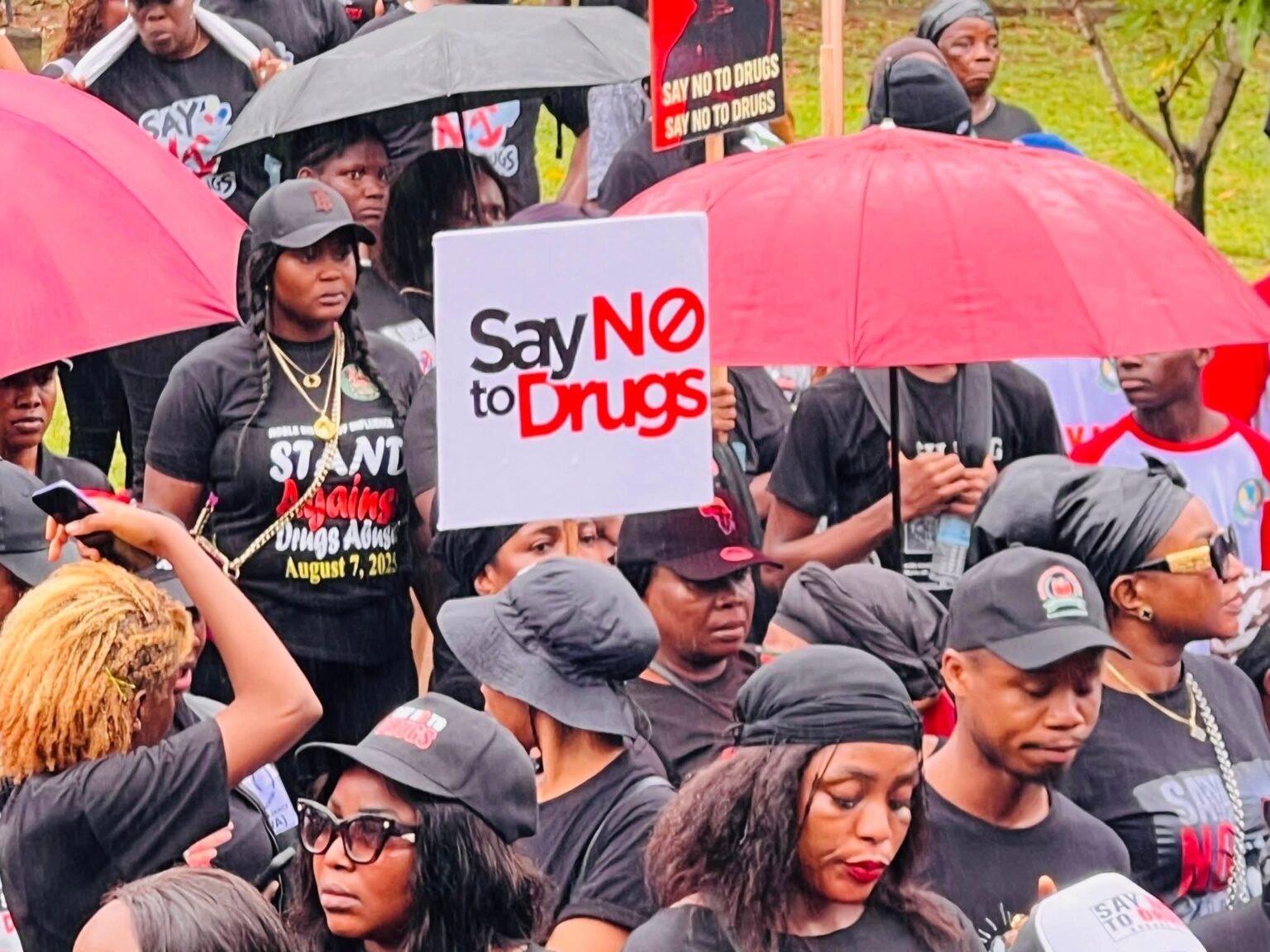Despite a heavy downpour across the capital and parts of the country, thousands of Liberians turned out in an unprecedented march to demand government action against the alarming rise in illicit drug abuse and trafficking.
From Monrovia to Margibi and Grand Bassa Counties, citizens from all walks of life filled the streets, unified in what they described as a national emergency, a desperate cry to save Liberia’s future from being destroyed by drugs.
The peaceful demonstration ended in the submission of a powerful petition to the Government of Liber ia, titled “A Cry to Save a Dying Generation and Protect Our Future.” In the petition, concerned citizens laid out fifteen comprehensive demands aimed at tackling the drug epidemic, calling on both the Legislative and Executive branches of government to act with urgency and resolve.
The petitioners decried the devastating impact of drugs on the nation, especially among its youth. They described scenes of despair in communities where young Liberians who should be future doctors, engineers, teachers, and leaders now roam the streets in zombie-like states, strung out on substances such as marijuana, heroin, kush, cocaine, tramadol, and other amphetamine-type stimulants.
These drugs, some of which are sold for as little as L$150, are wreaking havoc on the minds and bodies of Liberia’s youth, leading to illness, psychosis, organ damage, and death. Families are being torn apart, communities are disintegrating, and the very future of the country hangs in the balance.
Citing the April 2023 Global Action for Sustainable Development (GASD) Report, the petition revealed that Monrovia and its surrounding areas host more than 866 ghettos, which accommodate over 100,000 chronic drug users. These ghettos have become hubs of addiction, crime, and hopelessness. Meanwhile, the drug traffickers and dealers profiting from this destruction continue to walk free, protected by weak laws, lenient sentences, and in some cases, corrupt officials.
The demonstrators noted that while drug users face stigma and addiction, traffickers are enabled by a legal system that fails to hold them accountable. They called for an end to this imbalance, demanding justice, not vengeance, and urging the government to fulfill its constitutional obligation under Article 11(c) to ensure equal protection under the law.
In their appeal to the Legislative Branch, the petitioners called for amendments to the current drug laws to impose harsher penalties for traffickers, make rehabilitation mandatory for users, and authorize the confiscation and auctioning of assets acquired through drug trade.
They advocated for laws that hold carriers including ships, airlines, vehicles, and motorcycles accountable for transporting drugs, proposing stiff fines and confiscations to deter complicity in trafficking. They also pushed for the removal of import tariffs on drug treatment supplies, the creation of a special court to handle drug-related cases, and the establishment of a national agency to oversee prevention, rehabilitation, and reintegration efforts.
Furthermore, they challenged lawmakers to reduce their own salaries and channel those savings into programs for at-risk youth.
To the Executive Branch, the petition urged President Boakai to issue an Executive Order declaring illicit drugs a national pandemic, similar to the response mounted during Ebola and COVID-19.
They asked that August 7 be declared National Anti-Drug Day, and called for the creation of a joint Presidential Anti-Drug Task Force comprising civil society, the AFL, Liberia National Police, the Liberia National Bar Association, and religious institutions. This body would be responsible for coordinating public awareness, investigations, community engagement, and policy enforcement.
The petition called for an increase in budgetary support for at-risk youth programs, which have seen significant cuts in recent fiscal years. Petitioners also urged the establishment of regional rehabilitation centers including in prisons and government subsidies for private facilities offering drug treatment.
They demanded that all government rehabilitation services be free of charge and that tariffs on drug treatment supplies be eliminated to reduce operating costs and widen access to care.
In an effort to ensure long-term prevention, the petition proposed the creation of an Anti-Drug Fund, with resources drawn from taxes on alcohol, cigarettes, and gambling. These funds would support public education campaigns and drug awareness programs. The petitioners also called on the Ministry of Education to incorporate anti-drug education into school curriculums from primary to tertiary levels, and the Ministry of Health to regulate rehabilitation centers in line with international best practices.
The telecommunications sector, they argued, should collaborate with GSM companies to create toll-free hotlines and distribute public alerts related to drug operations. Citizens providing credible information leading to arrests should be rewarded. The petition also stressed the need to secure unfinished buildings often used as drug dens, expand job opportunities and vocational training for survivors through the Ministry of Youth and Sports, and ensure strict enforcement of laws banning the sale of alcohol and cigarettes to minors.
Finally, they called on the Liberia Drug Enforcement Agency (LDEA) and the immigration authorities to conduct screening of government officials’ and VIPs’ luggage at all entry and exit points, and advocated for mandatory drug testing in schools and as a prerequisite for employment.
In an emotional closing to the petition, the demonstrators made clear that their demands were not born out of vengeance but a profound desire for justice, protection, and survival. They warned that without swift and comprehensive government action, Liberia risks losing its next generation to drugs, leading to empty schools, rising crime, and deepening poverty. But with action, there remains hope for recovery and renewal.
“We trust that you will hear this cry and act with urgency to protect Liberia’s future. We are ready, willing, and able to participate in any Government efforts where we may be of assistance. We demand a drug-free Liberia. May God bless you, and may God save the Republic of Liberia,” the petition concluded.
The petition was officially presented under the banner of the “Say No to Drugs Campaign” on behalf of the thousands of Liberians who braved the rain in unity and hope, sending a clear message: enough is enough.

